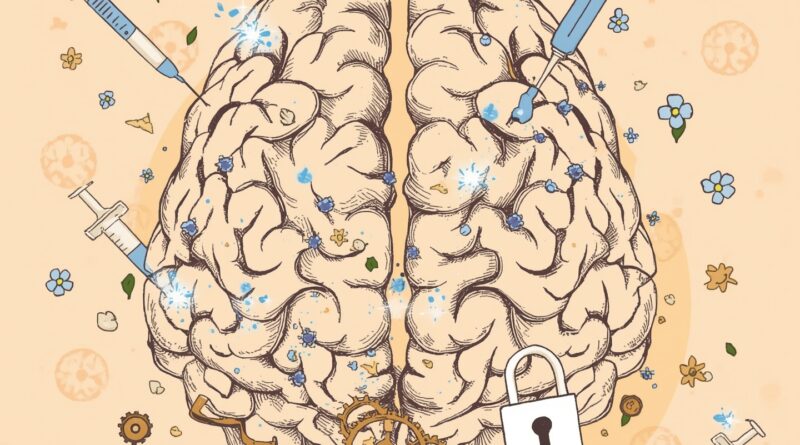Does Blood Sugar Affect Memory? Shocking Link Revealed
When Maya, a 62-year-old retired schoolteacher from Pune, began forgetting the names of her students—names once etched into her memory like chalk on a blackboard—her family dismissed it as the gentle fraying of time. She had, after all, crossed into her sixties, an age when memory was expected to wander. But then came stranger things: stoves left burning, keys misplaced in the refrigerator, sentences repeated with an eerie rhythm. What began as benign forgetfulness soon metastasized into confusion. A visit to the neurologist brought an unsettling diagnosis: Alzheimer’s disease. And, entwined with it, a familiar metabolic villain—Type 2 diabetes.
For years, diabetes has been portrayed as a disease of the body—a metabolic disorder with visible casualties: the eyes, the heart, the kidneys, the limbs. Its signs were retinal hemorrhages, failing kidneys, and limbs succumbing to neuropathy. However, the frontier is now shifting. Emerging studies suggest another organ under silent siege: the brain.
Insulin, we have long believed, is a hormone that patrols the corridors of sugar metabolism, ensuring that glucose flows into the body’s cells. But its role is more profound, more intimate. In the brain, insulin choreographs complex cognitive functions—learning, memory, and synaptic repair. When neurons grow resistant to insulin’s signals, those cognitive pathways begin to darken. The brain, starved of this essential hormone, begins to misfire. Memory fades not with time, but with the quiet, chronic sabotage of metabolic imbalance.
We are now beginning to understand that diabetes is not just a disease of blood sugar—it is, in many ways, a disease of forgetting: the kind that erodes not just life, but the story of a life.
Forty and Forgetful
Here’s where things start to get especially squirmy— a developing and overpopulated country like India, already juggling over 100 million diabetics (yes, that’s million, with an “m”), according to The Lancet, is now facing a cognitive double-whammy. Not only are people getting diagnosed with Type 2 diabetes in their 40s, but some are clocking in as early as their 30s. That’s prime memory real estate being put at risk before the first gray hair even shows up.
And the science backs up the bad news. A 2021 study out of Europe (published in JAMA Network Open, for those of you who like your doom peer-reviewed) tracked over 10,000 adults between the ages of 35 and 55 for more than 30 years. The results? Let’s just say that if Type 2 diabetes were a time bomb, the fuse gets shorter the longer you’ve had it. For every 1,000 people studied each year, dementia rates were 10 for recent diagnoses, 13 if you’d been diabetic 6–10 years, and over 18 if your blood sugar had been spiking for more than a decade. It’s like an interest rate for forgetfulness—the longer the loan, the more brainpower you pay back.
Now combine that with India’s rapidly aging population, and what you’ve got is less “silver tsunami” and more “memory mudslide.” The Lancet predicts a 197% surge in dementia cases in India by 2050. That’s not a typo. That’s nearly triple. Among the steepest climbs in the world, by the way.
So yes, diabetes can cost you a foot, a kidney, or your eyesight. But it can also sneak in and start picking the locks on your memories—and in India, that’s shaping up to be an epidemic within an epidemic.
How High Blood Sugar Impacts Memory?
1. Neuronal Damage and Brain Shrinkage
Here’s a fun fact that’s not actually fun at all: chronic hyperglycemia (aka consistently high blood sugar, the kind that hangs around like a nosy neighbor in Type 2 diabetes) has been linked to shrinkage in the hippocampus—the part of your brain that handles memory, navigation, and generally knowing where your keys are.
One study published in Neurology (a journal that sounds reassuringly serious) looked at HbA1c levels—that’s the long-term blood sugar report card your doctor’s always frowning at—and found that higher levels were associated with smaller brain volumes and worse performance on memory tests. And here’s the kicker: this wasn’t even in diabetics. These were non-diabetic adults, whose brains were apparently just as sugar-sensitive as everyone else’s.
So yes, even if you’re not full-on diabetic, your hippocampus might still be on the receiving end of your dessert habits. Sweet, right?
2. Inflammation and Oxidative Stress
Too much sugar in the bloodstream doesn’t just mess with your pancreas or make your dentist sigh heavily—it also kicks off a slow-motion riot in your body. Think systemic inflammation and oxidative stress—the biological equivalent of setting your neurons on fire and then blowing cigarette smoke in their faces.
According to The Journal of Clinical Endocrinology & Metabolism (a title that practically begs for a nap but delivers the goods), this kind of neuronal wear-and-tear is a major contributor to memory decline and ups your risk for dementia. In other words, your brain really doesn’t appreciate being marinated in glucose.
So the next time someone says “It’s just a little sugar,” remember: it’s not just about your waistline or your insulin. Your neurons are quietly filing a complaint—and they’re not going to forget about it. Unless, of course, they actually do.
What is Type 3 Diabetes?
The connection between sugar and forgetfulness is now so compelling that some researchers have taken to calling Alzheimer’s “Type 3 diabetes.” Yes, that’s right—we’re adding another sequel to the diabetes franchise, and this one comes with memory loss and a side of cognitive chaos.
But before you panic: not everyone with diabetes gets Alzheimer’s. However, toss in obesity, and the risk doesn’t just double—it can triple. Contrary to what early brain boffins believed, it’s not because the brain simply wants insulin like it wants oxygen or TikTok. In Alzheimer’s, the brain becomes both insulin resistant and insulin deficient. That’s the metabolic version of getting locked out of your own house and losing the key. Brain cells can’t use glucose properly; they begin to starve, and a spectacular biochemical domino effect ensues: inflammation, toxic gunk buildup, and neurons dropping like flies.
And Alzheimer’s isn’t the only flavor of sugar-fueled forgetfulness. There’s also vascular dementia, which is what happens when the blood vessels in your brain get cranky and clogged. In long-time diabetics, doctors often see a messy blend called mixed dementia—a bit of Alzheimer’s here, a splash of vascular damage there. It’s like a neurodegenerative cocktail nobody ordered.
Add to this India’s national buffet of high-carb diets, couch-friendly lifestyles, and genetic leanings toward belly fat and insulin resistance, and you’ve got a full-blown public health stew. Stir in a hearty helping of cultural stigma—where forgetting your grandkid’s name is chalked up to “just stress” or “old age”—and diagnosis often arrives late, if at all. Meanwhile, patients quietly unravel, their symptoms dismissed until it’s far too late for memory games.
Brain Span Key to Quality of Life
With dementia cases piling up like unread WhatsApp messages, experts are now waving red flags and calling for a proper dementia policy—something that doesn’t just count the years in your life, but the brain span in those years. That’s doctor-speak for how long your brain stays sharp enough to remember your ATM PIN and why you walked into the kitchen in the first place.
So how does one stretch the brain span without diving into a vat of crossword puzzles and green tea? Turns out, your best bet might be the Mediterranean diet—that sexy, olive oil-drizzled lifestyle packed with leafy greens, whole grains, nuts, and fats that actually do your neurons a favor. Not only does it help keep blood sugar from behaving like a roller coaster, but it also acts like bubble wrap for your brain cells.
And then there’s exercise—not just a casual stroll to the fridge, but actual aerobics and strength training. These activities crank up your insulin sensitivity (good), and dial up levels of BDNF, or Brain-Derived Neurotrophic Factor. That’s science-speak for the magical stuff that keeps your neurons thriving and your brain from turning into a sleepy potato.
In short, if you want your mind to stay sharp, feed it like a Greek farmer and move it like a jazzercising gazelle.
Preventive Strategies: Keeping Memory Sharp
To protect your memory and brain health, experts recommend:
- Maintaining stable blood sugar through a balanced diet rich in fiber, protein, and healthy fats.
- Regular exercise, which improves insulin sensitivity and cognitive function.
- Cognitive stimulation and lifelong learning.
- Blood sugar monitoring for those with diabetes or prediabetes.
CITATIONS
Effect of recurrent hypoglycemia on spatial cognition and cognitive metabolism in normal and diabetic rats – https://pubmed.ncbi.nlm.nih.gov/14747293/
Neurology Journals – https://www.neurology.org/
The Journal of Clinical Endocrinology & Metabolism – https://www.endocrine.org/journals/jcem
Higher normal fasting plasma glucose is associated with hippocampal atrophy: The PATH Study – https://pubmed.ncbi.nlm.nih.gov/22946113/
Get updates and read additional stories on the Health Orbit Fan Page.
For Guest posts, Sponsored posts and other details, please click ‘Contact Us’ page.





Pingback: How Poor Sleep Disrupts Hormones, Weight & Mental Health? - Medical & Health News Update| Health Orbit